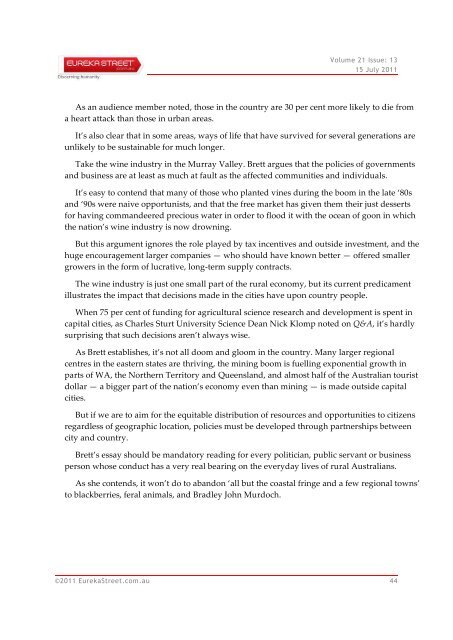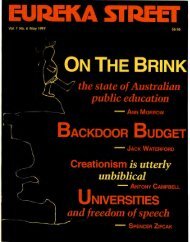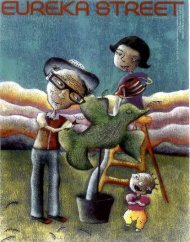15 July 2011 Volume: 21 Issue: 13 North Korea's ... - Eureka Street
15 July 2011 Volume: 21 Issue: 13 North Korea's ... - Eureka Street
15 July 2011 Volume: 21 Issue: 13 North Korea's ... - Eureka Street
Create successful ePaper yourself
Turn your PDF publications into a flip-book with our unique Google optimized e-Paper software.
<strong>Volume</strong> <strong>21</strong> <strong>Issue</strong>: <strong>13</strong><strong>15</strong> <strong>July</strong> <strong>2011</strong>As an audience member noted, those in the country are 30 per cent more likely to die froma heart attack than those in urban areas.It’s also clear that in some areas, ways of life that have survived for several generations areunlikely to be sustainable for much longer.Take the wine industry in the Murray Valley. Brett argues that the policies of governmentsand business are at least as much at fault as the affected communities and individuals.It’s easy to contend that many of those who planted vines during the boom in the late ‘80sand ‘90s were naive opportunists, and that the free market has given them their just dessertsfor having commandeered precious water in order to flood it with the ocean of goon in whichthe nation’s wine industry is now drowning.But this argument ignores the role played by tax incentives and outside investment, and thehuge encouragement larger companies — who should have known better — offered smallergrowers in the form of lucrative, long-term supply contracts.The wine industry is just one small part of the rural economy, but its current predicamentillustrates the impact that decisions made in the cities have upon country people.When 75 per cent of funding for agricultural science research and development is spent incapital cities, as Charles Sturt University Science Dean Nick Klomp noted on Q&A, it’s hardlysurprising that such decisions aren’t always wise.As Brett establishes, it’s not all doom and gloom in the country. Many larger regionalcentres in the eastern states are thriving, the mining boom is fuelling exponential growth inparts of WA, the <strong>North</strong>ern Territory and Queensland, and almost half of the Australian touristdollar — a bigger part of the nation’s economy even than mining — is made outside capitalcities.But if we are to aim for the equitable distribution of resources and opportunities to citizensregardless of geographic location, policies must be developed through partnerships betweencity and country.Brett’s essay should be mandatory reading for every politician, public servant or businessperson whose conduct has a very real bearing on the everyday lives of rural Australians.As she contends, it won’t do to abandon ‘all but the coastal fringe and a few regional towns’to blackberries, feral animals, and Bradley John Murdoch.©<strong>2011</strong> <strong>Eureka</strong><strong>Street</strong>.com.au 44
















